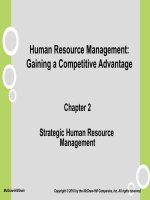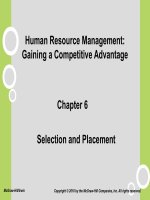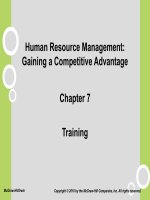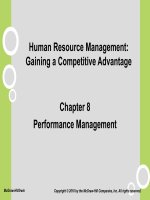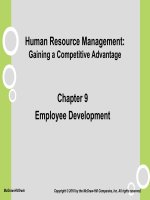Human resource management gaining a competitive advantage 2014 chapter 5
Bạn đang xem bản rút gọn của tài liệu. Xem và tải ngay bản đầy đủ của tài liệu tại đây (582.3 KB, 10 trang )
Human Resource Management:
Gaining a Competitive Advantage
Chapter 05
Human Resource Planning and
Recruitment
McGraw-Hill/Irwin
Copyright © 2013 by The McGraw-Hill Companies, Inc. All rights reserved.
Forecasting Stage of HR Planning
Determine Labor Demand
derived from product/service demanded
external in nature
Determine Labor Supply
Internal movements caused by transfers, promotions,
turnover, retirements, etc.
transitional matrices identify employee movements
in different job categories over time to chart historical
trends in company’s labor supply
useful for AA / EEO purposes
Determine Labor Surplus or Shortage
5-2
Options for Reducing Expected
Labor Surplus
Option
1.
2.
3.
4.
5.
6.
7.
8.
9.
Downsizing
Pay reductions
Demotions
Transfers
Work sharing
Hiring freeze
Natural attrition
Early retirement
Retraining
Speed
Fast
Fast
Fast
Fast
Fast
Slow
Slow
Slow
Slow
Human Suffering
High
High
High
Moderate
Moderate
Low
Low
Low
Low
5-3
Options for Avoiding Expected
Labor Surplus
Option
Speed
Revocability
Fast
Fast
Fast
Slow
Slow
Slow
Slow
5-4
Downsizing
Downsizing -planned elimination of large numbers of
personnel to enhance organizational competitiveness.
4 Reasons for Downsizing:
1. reduce labor costs
2. technological changes reduce need for labor*
3. mergers and acquisitions reduce bureaucratic
overhead
4. organizations change location of where they do
business
* Economy wide, capital spending ratio increased over 300% between 19902010, indicating employers substituting technology for labor.
5-5
Possible Negative Effects of Downsizing
Long-term effects of an improperly managed
downsizing effort can be negative.
Lower long-term profit, performance and productivity
Loss of talent
Disrupts social networks needed for creativity and
innovation
5-6
Early Retirement Programs
The average age of U.S. workforce is increasing.
Baby boomers are not retiring early due to:
improved health
fear that Social Security will be cut
mandatory retirement is outlawed
collapse of the financial and housing markets made it
economically unviable to retire
Many employers try voluntary attrition among
older workers through early retirement incentive
programs.
5-7
Employing Temporary Workers
Hiring temporary workers helps eliminate a labor
shortage and affords flexibility needed to operate
efficiently during demand swings.
3 Advantages:
1. Temporary workers free a company from
administrative tasks and financial burdens.
2. Temporary workers are often times tested by a
temporary agency.
3. Many temporary agencies train employees before
sending them to employers.
5-8
Outsourcing and Offshoring
Outsourcing uses an outside organization for a
broad set of services.
Offshoring is outsourcing where jobs leave one
country and go to another.
To help ensure the success of outsourcing:
Choose an established, large outsourcing vendor.
Jobs that are proprietary or require tight security
should not be outsourced.
Start small and monitor constantly.
5-9
Recruitment Sources
JOBS
Newspaper Advertising large volume, low quality
recruits
5-10

